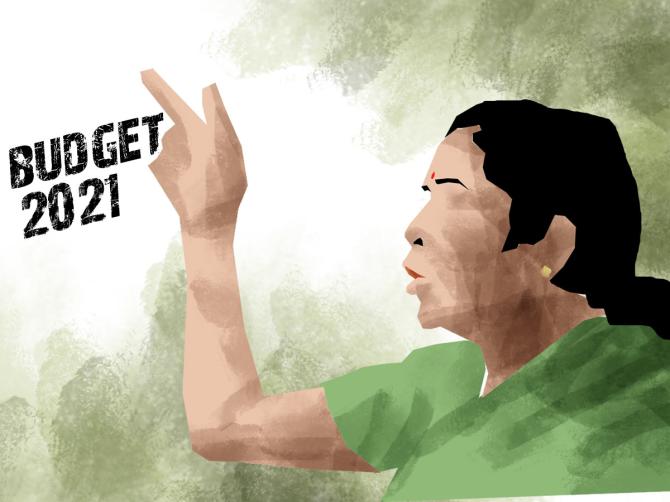There are several welcome standalone reforms, but these do not add up to a coherent strategy to achieve a $5 trillion economy or secure Aatmanirbharta, observes Rathin Roy.

The finance minister in her Budget speech returned to the basic business of the Budget and clearly outlined the macro-fiscal position.
This is important, because the speech is a document in record, and citing the numbers makes the government accountable to parliament and to history for their veracity.
It was also very positive that the minister committed herself to bringing off-Budget transactions on-Budget and made at least a faltering start to thinking about expenditure programming over a five-year horizon.
It was a relief to see that vertical devolution to states has been left unchanged by the Fifteenth Finance Commission and that additional devolution in grants has also been proposed and accepted.
FY20-21 started on a weak note with low revenue buoyancies and further slippage on the fiscal deficit target.
The fallout of the pandemic created further pressure on the government, on resource mobilisation, and on the need to protect, even increase, expenditures to sustain the economy.
I was, therefore, not concerned with the magnitude of the rise in the fiscal deficit but rather with what was done with the borrowed money.
The fiscal deficit has risen by 6 per cent of GDP. Of this, one per cent is due to a fall in revenues.
However, this has mainly been driven by a decline in non-tax revenues due to a sharp decline in dividend from public enterprises.
The fall in tax revenues has been relatively modest -- just 0.43 per cent of GDP.
This is because increases in Union excise duties, accruing in major part due to buoyant petroleum excise receipts, compensated in large measure for shortfalls in direct tax and goods and services tax. But the big hole that was punched in resource mobilisation was not due to Covid.
Divestment receipts collapsed from the budgeted Rs 2.1 trillion to Rs 32,000 crore, even though equity and capital markets were buoyant.
As with poor revenue performance, this failure reflects poor implementation capabilities in the ministry of finance. They could not do what Reliance Industries could.
The minister claimed major increases in capital expenditure, but this is not borne out by the numbers.
The revenue deficit measures how much the government borrows to finance its revenue expenditures.
In the 2020-21 BE, such borrowing was budgeted to account for 77 per cent of the fiscal deficit, leaving only 23 per cent for capital expenditure.
In the Revised Estimates, this has shrunk to 21 per cent. Next year the government proposes that this will increase to 24 per cent, which is by no means significant in terms of the composition of public spending. The big-ticket numbers don't quite add up when confronted with the reality of the fiscal math.
This year the committed expenditure[i] story is a bit different. Optically, it appears that committed expenditures have fallen slightly.
However, the bulk of this fall has occurred because of the failure to collect the GST compensation cess.
Hence, this has made the states poorer by Rs 26,400 crore, and offset the impact of the increase in Finance Commission grants, which rose by Rs 32,427 crore.
Total expenditure has risen appreciably by over Rs 4 trillion. However, the bulk of this has been not income support or health expenditure.
At least 80 per cent of the incremental expenditure has been incurred for food- and fertiliser-related subsidies and another 12 per cent for increase in MGNREGS outlays.
Thus, the much-touted fiscal stimulus has essentially been about relief, and, while welcome, does not indicate that fiscal resources have been used with a view to shaping economic recovery.
Thus, of the 6 per cent fiscal deficit increase, about a third is due to shortfalls in resource mobilisation and the bulk of the remainder for relief and subsidies.
Investment has played little part in the story, nor has increased expenditure on health care.
Revenue expenditure continues to be the principal source of increase in the fiscal deficit.
Regrettably, the pandemic has not triggered structural changes in the Budget that point to an active fiscal policy to foster economic revival, which is why the GDP estimate for FY22 is still lower than the aspiration for 2019-2021.
Next year, the Budget aims to reduce the fiscal deficit principally by curtailing growth in revenue expenditure.
There is no ambition to increase revenue receipts. This is laudable modesty, given the abysmal record over the past four years.
However, this modesty does not extend to disinvestment, where the figure has only been slightly tapered.
This is the Achilles' heel in fiscal planning, going forward. Talk of asset monetisation and disinvestment will have to be walked much more effectively than has been done in the lifetime of this government.
So, this was very much a business-as-usual Budget that presents a record of how government spent money to alleviate the impact of the pandemic on people's ability to eat and eke out a living, even as the richer sections of society enjoyed an increase in profits.
Despite the economic challenge confronting India, Arun Jaitley's 2016 Budget continues to be the gold standard for this administration.
There is no evidence of an economic strategy, or a medium-term spending battleplan, that would address the scarring caused by the pandemic, or a reform strategy to change demand composition, or even foster export-led growth.
There are several welcome standalone reforms, but these do not add up to a coherent strategy to achieve a $5 trillion economy or secure Aatmanirbharta.
There is no particular logic that has been explicated for the new fiscal responsibility and budget management targets; I will have to analyse the Finance Commission report to see if there is any.
Even so, I am thankful for small mercies like increased transparency, some positive initiatives to simplify tax administration, and the attempt to bring off-Budget items into fiscal accounting.
Rathin Roy is managing director, ODI, London. r.roy@odi.org. Views are personal.
Feature Presentation: Rajesh Alva/Rediff.com











